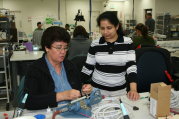
“I was attracted to the field of electronics because I have always been curious about the way electronics components work together. It’s a challenge when I have to troubleshoot the part and get to figure out why and how certain processes work the way they do.” |
|
Career Path: Students who enroll in the Electronic Technology program may pursue either an A.S. or A.A. degree or a certificate. A degree or certificate in Electronic Technology from Irvine Valley College will equip you for employment in the computer, software, biomedical, telecommunications, automotive, aerospace, and consumer electronics fields. Once graduates obtain employment in a company, supervisory and management positions may also become available. Or, you can continue your education at California State University Pomona (and soon, California State University at Long Beach) to earn a bachelor's degree in Engineering Technology.
Students who enroll in the Electrician Training program are advised to hold down
entry-level employment or apprenticeship while in school if possible. In California, the law currently requires electrician trainees to be enrolled in an authorized training program until they are certified through a state-administered exam. Applicants for certification cannot take the exam until they have accumulated a certain number of hours of work in the field (the exact number depends on the certification).
Students seeking a career as an electrician should enroll in an authorized training program like IVC’s in order to be legally employable as a trainee. Students must then register as an electrician trainee. Then they can seek an entry-level position in which to begin working and accumulating the necessary hours to be able to take the state certification exam. The classroom training at IVC helps prepare students to pass the exam. Experienced electricians may advance to lead, supervisory or chief electrician positions.
Read more about the State of California electrician certification program and about how apprenticeship programs work at the state-approved program website.
Nature of the Work: Electronic technicians work in a hands-on environment with high tech devices such as:
- Computers and peripherals
- Communication devices, such as radios, televisions, cell phones, and modems
- Medical equipment
- Entertainment products, such as CD, stereo, and video games
- Automotive equipment, such as computerized engine controls, test equipment, and car stereos
- Industrial equipment, such as monitors, controllers, and robotics
For electronic technicians, the work largely involves mental problem solving, and requires minimal physical exertion. A technician servicing a non-functioning medical monitor, for example, would perform various tests on the unit, using standard laboratory measurement equipment such as a voltmeter, oscilloscope, or computerized tester, in order to determine and ultimately repair the problem.
Electrical technology/electrician work is more physical in nature, and may include moving around a job site, climbing ladders, assembling and disassembling equipment, running wires and cables, installing electrical fixtures, etc. Mental problem solving is also required – for example, in the design of electrical circuits.
Work Environment: For electronic technicians, the work environment is most likely indoors, in a clean, quiet laboratory or office setting. Some positions may require exposure to manufacturing floor conditions.
For electricians, work environments may include indoor and outdoor construction sites, manufacturing floors, and the equipment rooms of plants, offices, and retail buildings.
Specific Jobs Available to Graduates:
Electronic Technology Graduates:
- A graduate of a certificate or A.S. degree program in electronic technology is qualified for a job as an electronic technician in a wide variety of industries. Larger firms may prefer to hire applicants with an A.S. degree rather than the certificate only.
California Electrical Certification Training:
- Students enrolled in the IVC Electrical Certification Training program become eligible for positions as electrician trainees and apprentices. Certification is provided by the state after trainees accumulate the required number of supervised work hours and pass the state certification exam.
Industries Employing Graduates of this Program: In electronic technology, a wide range of industries employ technicians, including telecommunications (telephone and cable TV), biomedical, computer, automotive, aerospace, and the government. Companies that hire graduates of the electronics program include: Baxter, Parker Hannifin, Toshiba, Alcon Labs, Conexant, Q Logic, Western Digital, Wonderware, Broadcom, Agilent, Allergan, and Medtronic.
In electrical technology, industries hiring graduates include construction firms, hotels, hospitals, schools, manufacturing firms, the government, and generally any institution operating and maintaining facilities. Large commercial contractors such as Hackney Electric and smaller local electrical contractors hire students in training in the electrical program.
Irvine Valley College has an advisory committee comprised of industry representatives who are invited to an annual meeting to discuss our educational programs and their job opportunities.
Women in Electronics Associations
Career FAQs
Course Description:
Electronic Technology degrees, certificates, and training offered:
- Certificate of Achievement in Electronic Technology
Provides a solid foundation for further study in the field or immediate employment as electronic technician. - Certificate of Competency as Electronic Aide
Equips graduate for employment in the electronics industry in roles such as testing, quality assurance, customer support, production support, equipment maintenance, and technical sales - Associate of Science (A.S.) degree in Electronic Technology
Opens broad opportunities for academic and career growth as electronic technician. The program also prepares you to transfer to two nearby campuses of the California State University to complete a bachelor’s degree. - Electrician Certification Training
Offers instruction in part of the curriculum adopted by the Electrician Certification Curriculum Committee (ECCC), which helps students prepare for the state-required certification exam to work as a licensed electrician and allows them to work as electrician trainees to build the experience and hours required for certification.
Electronic Technology Degree and Certificate Programs:
Courses required for major include:
- Basic Electric Circuits
- Electronic Devices and Circuits
- Digital Electronic Circuits
Other required courses may include Industrial Electronics or Introduction to Microprocessors and computer programming languages such as BASIC, Pascal, C, and Assembly.
Total units for major: 28.
Visit the Electronic Technology Department website and the college catalog for specific course information and general education requirements.
Electrician Certification Training Program:
Irvine Valley College is an approved provider of electrician training under Assembly Bill 1087. Irvine Valley College provides instruction for part, but not all, of the curriculum standards adopted by the Electrician Certification Curriculum Committee (ECCC). The courses offered by Irvine Valley College covers only the curriculum standards in math and electrical theory.
Courses include the following subjects:
- Residential Wiring
- Basic Electric Circuits
- Electronic Devices and Circuits
- Introduction to Microprocessors
- Arithmetic Review and Pre-Algebra Mathematics
Working students may also enroll in Cooperative Work Experience to earn college credit for supervised work experience in their field of study.
Visit the IVC Electrician Certification Training website and the State of California Electrician Certification Program for details.
Prerequisites: There are no prerequisites required to enter these programs.
Hours Offered: Classes are offered in the evenings on a regular or fast-track schedule to accommodate the needs of working students. Some general education classes are offered online, although none of the courses in the major are available online.
Length of Program: The A.S degree in Electronic Technology takes up to 2-1/2 years to complete. A certificate in Electronic Technology takes between 1 and 1-1/2 years, depending on whether the student is employed.
Electrician Certification Training continues until the student passes the State Certification Exam. For details, visit the IVC Electrician Certification Training website.
Instructor Information: Tutoring: |
Academic Counseling: |
Financial Aid Contact
|
Job placement: |
A small amount of preparation can help make your days in the classroom go more smoothly. Visit the CalWomenTech Learning Library to find software and other tools to advance your math, spatial reasoning skills and much more. Visit the Tutoring Center to find out how tutoring can help.
 Copyright 2010 National Institute for Women in Trades, Technology & Science | http://www.iwitts.com |


